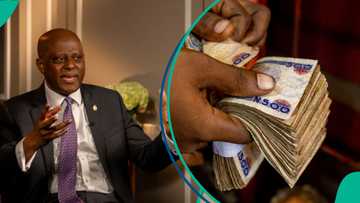Borrowing Made Easy: CBN Cuts Interest Rates to 27%, First in 5 Years
- The Central Bank of Nigeria (CBN) has cut the interest rate in Nigeria, lowering it to a five-year low
- The apex bank disclosed the new MPR at its Monetary Policy Committee (MPC) meeting on Tuesday, September 23, 2025
- The development followed a successive drop in inflation in Nigeria and the stability of the foreign exchange rate
Pascal Oparada, a reporter for Legit.ng, has over ten years of experience covering technology, energy, stocks, investment, and the economy.
For the first time in half a decade, the Central Bank of Nigeria (CBN) has lowered its key lending rate, signalling a cautious shift toward growth-friendly policies.
At the end of its Monetary Policy Committee (MPC) meeting in Abuja, the apex bank reduced the Monetary Policy Rate (MPR) by 50 basis points to 27%.

Source: Twitter
The move, officials say, balances two priorities—supporting economic recovery and ensuring inflation remains under control.
Balancing growth and inflation
The MPC’s decision did not stop at rate cuts. In a bid to encourage bank lending and expand private sector credit, the Cash Reserve Requirement (CRR) for commercial banks was reduced from 50% to 45%.
Merchant banks retained their CRR at 16%, but non-Treasury Single Account (TSA) public sector deposits will now attract a hefty 75% CRR.
The Liquidity Ratio was left unchanged at 30%, while the Standing Facilities Corridor was widened to ±250 basis points around the MPR.
Analysts say these tweaks show the CBN’s attempt to “loosen where it helps growth, but tighten where excess liquidity could spark inflation.”
Why now?
According to Governor Olayemi Cardoso, the decision was guided by recent trends. Inflation has been on a steady decline for five months, and forward projections point to further easing.
Stable exchange rates, cheaper petrol, better crude oil output, and increased capital inflows are all helping to cool prices.

Read also
Naira gains big with stronger reserves, lower import costs, fresh confidence in Nigeria’s economy
“The onset of the harvest season will boost local food supply, moderate prices, and strengthen the disinflation trend,” Cardoso explained.
All 12 MPC members voted for the cut, underlining broad consensus.
The bigger picture: economic fundamentals improving
The rate cut comes at a time when Nigeria’s broader economic indicators are looking healthier. GDP expanded by 4.23% year-on-year in Q2 2025, compared to 3.13% in Q1, driven mainly by a rebound in oil production.
External reserves rose to $43.05 billion as of September 11, up from $40.51 billion in July, giving an import cover of over eight months.
The naira, long battered by volatility, has steadied thanks to stronger capital inflows and a $5.28 billion current account surplus in Q2.
What it means for small businesses, households
For small and medium-sized enterprises (SMEs), the easing of monetary conditions could be a game-changer.
Access to cheaper loans from banks like Access, UBA, and Zenith may help businesses expand, hire more workers, and cushion against rising operating costs.
Microbusinesses, such as traders, farmers, and artisans, stand to benefit too. With credit slightly more affordable, they can restock inventory, invest in equipment, and withstand shocks from inflation.
Households could also feel relief as banks adjust lending rates downward on consumer loans.
However, the benefits may not be automatic. Banks, still cautious from years of high default risks, may not quickly slash lending rates.
SMEs will need supportive fiscal measures, alongside the CBN’s actions, to fully enjoy the trickle-down impact.
What it means for Nigerians
By lowering borrowing costs while tightening liquidity in sensitive areas, the CBN is attempting a delicate balancing act.
If successful, Nigeria could enter a new phase of growth where businesses have more breathing room and inflation continues to decline.

Source: Getty Images
For now, small businesses and everyday Nigerians will be watching closely to see if the much-anticipated “cheaper credit” translates from policy rooms in Abuja to reality at the bank counter.
CBN exposes dollar accounts to risk as naira gains
Legit.ng earlier reported that CBN renewed reforms in the foreign exchange (FX) market are driving a stronger naira and increasing external reserves.

Read also
Nigeria's oil & gas sector: Investor confidence soars as reforms take hold, energy group says
But as the local currency continued to appreciate, a new risk emerged; Nigerians holding dollar accounts or hoarding foreign currency might be sitting on potential losses.
Since Yemi Cardoso assumed leadership of the CBN, the apex bank stepped up interventions in the FX market to close the gap between the official and parallel windows.
Source: Legit.ng



